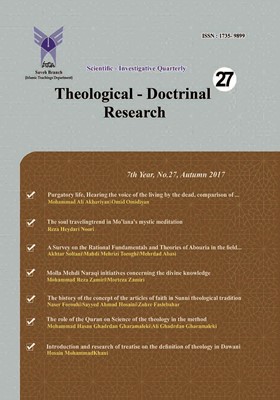A Survey on the Rational Fundamentals and Theories of Abouria in the field of Hadith
Subject Areas : کلام اسلامی1 , mehrdad abbasi 2 , Akhtar Soltani 3
1 -
2 -
3 -
Keywords: The sunni hadith, hadith critics, hadith critique, content critique, quoting based on definition, sermon method and behavioral method ,
Abstract :
The knowledge of hadith is one of the most important issues among Sunni scholars and priests. It is considered much significant how to use and how to consider this knowledge. Accordingly there have been different doctrines created around the hadith, such as “Quraniyoon” , “Ahl-e-hadith” , “Salafia” and also “hadith critics”. In the present paper it has been assayed to indicate some outstanding features and properties of the three mentioned schools and then the hadith critics doctrine has been studied focused on the Rational Fundamentals and Theories of “Muhammad Abouria” , one of the prominent scientists of this school. Some of his hadith basics include: No opposition to Quran, No agreement with sunnah, No agreement with whatever proven by the science and No opposition to the wisdom. Abouria commented on different issues related to the knowledge of hadith such as prohibition on writing and publication of hadith in the first couple of hegira centuries, multiplicity of forges and editions, emphasis on the content critique in order to distinguish right and wrong narrations, No regulation and legislation of the single narration over the beliefs. existence of quoting based on definition in the hadiths, difference between the manner of sermon and behavior and so on. This study pursues these topics and answers to the related problems and ambiguities with an analytical, descriptive and librarian method
1. قرآن کریم.
2. ابوریه محمود،(1428ق)، اضواء علی السنۀ المحمدیۀ(او دفاع عن الاحدیث)، قم، دارالکتاب الاسلامیه، الثانیه.
3. ابوریه محمود،(1964م)، اضواء علی السنۀ المحمدیۀ، بیروت، مکتبۀ صور، الاولی.
4. ابوریه، محمود، (1999ق)، اضواء علی السنه المحمدیه، قم، موسسۀ انصاریان، الثانیۀ.
5. ابوریه، محمود، (1969م)، اضواء علی السنۀ المحمدیۀ(او دفاع عن الاحدیث)، مصر، دارالمعارف، الثالثۀ.
6. ابوریه، محمود،(1389)، سنّت محمدی(ص) درگذر تاریخ(الأضواء علی السنّۀ المحمدیۀ»، ترجمه سید محمد موسوی، قم، ذوی القربی، اول.
7. ابوریه، محمود، شیخ المضیره؛ ابوهریره(بازرگان حدیث)، (1343ش)، ترجمه محمد وحید گلپایگانی، تهران، کتابفروشی محمدی، اول.
8. الهي¬بخش، خادم حسين،(1421ق)، القرآنيون و شبهاتهم حول السنه، طائف،.
9. ابوریه، محمود، شیخ المضیرۀ؛ ابوهریره، (1969م)، مصر، دارالمعارف، الثالثۀ.
10. مهدوی راد، محمد علی، (1389)، معارف، مجید، دانشنامه جهان اسلام (حدیث و حدیث پژوهی) مقاله حدیث و قرآن. نوشته آقایی، سید علی ، تهران ، نشرکتاب مرجع.
11. بخاری، محمد بن اسماعیل، (1401ق)، صحیح بخاری، ج4، بیروت، دارالفکر،.
12. حلی، علامه یوسف بن مطهر، کشف المراد فی شرح تجرید الإعتقاد، قم، مکتبة المصطفوی.
13. خضري، محمد،(1373ق)، تاريخ التشريع الاسلامي، قاهره، بي¬نا،.
14. راغب اصفهانی،(1422ق)، المفردات، بیروت، دارالمعرفة،.
15. رضوي ، سيد مرتضي، (1418ق)، مع الرجال الفكر في القاهرة، مصر، بيروت، دارالارشاد للطباعة و النشر،.
16. سباعي، مصطفي،(1427ق) السنه و مكانتها في التشريع الاسلامي، مصر، دارالسلام،.
17. شاخت،یوزف،(1387)،درآمدیبرفقهاسلامی،ترجمهسید یاسر میردامادی ، تهران، نشر گام نو،.
18. شهرستانی،محمدبنعبدالکریم، (1358)،توضیح الملل،ترجمه محمد رضا جلالی نائینی،بی جا،.
19. فهیمی¬تبار، حمیدرضا،(1389)، کاوشی در روایت تأبیر النخل، دو فصلنامه حدیث پژوهی، سال دوم، شماره جهارم، پاییز و زمستان.
20. محمد قاسمی، حمید،(1380)، اسرائیلیات و تأثیر آن بر داستان های انبیاء در تفاسیر قرآن ، تهران، انتشارات صدا و سیما.
21. معارف،مجید،(1387)، پژوهش¬هایحدیثیدردورهمعاصر،دانشکدهمجازیعلوم حدیث، تهران. 22. مهریزی، مهدی، نقد متن1(پیشینه تاریخی)،مجله علوم حدیث، شماره 26،1381.

